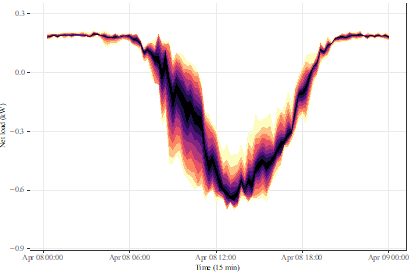Online forecast combination and forecast model chain simplification to enhance renewable energy forecasting

Dennis currently works as a Postdoctoral Researcher at Mines Paris – PSL where he focuses on probabilistic forecasting of renewable energy sources such as solar or wind power. His work combines statistics with engineering and meteorology, falling under the wider umbrella of data science.
The increasing penetration of renewable energy sources, such as wind power or solar power, into the electricity generating mix poses challenges to the operational performance of the power system. These challenges are mainly related to the variability and intermittency of the power they produce, caused by the weather. In order to ensure the stable operation of the power system while allowing the number of renewable energy sources to increase, it is necessary to accurately forecast the power output so that grid-operators can mitigate imbalances.
Nevertheless, the power production is a stochastic process and contains many uncertainties; it is therefore important to generate so-called probabilistic forecasts that express the uncertainties by means of probability distributions. The figure shows a probabilistic forecasts from 15 min ahead up to 24 h ahead of the net load of a dwelling with a PV system where the coloured area represents the probability distribution at each time. Such information could then be used to optimize the control of a battery system, as was done in the case of the illustration.
Even though the field of probabilistic forecasting is quite advanced, there are still many challenges ahead. For instance, there is a need to simplify model-chains; at the moment, a multitude of models is required across different horizons and variables. Ideally, they would be merged into one or two models. Another interesting challenge is that of missing or corrupted data and how to ensure that our models continue to function. Similarly, combining forecasts from different providers is an excellent way to increase the robustness of the final forecast against missing data and improve its accuracy; doing this is in an online setting will improve robustness even further.

“Frankly, there are so many challenges and this makes it a very interesting and dynamic research field! Currently, I focus mainly on online forecast combination as well as forecast model chain simplification, the latter of which we presented at the PMAPS conference held in June. Be sure to check out those publications if you want to learn more!”
Consult the Smart4RES Resource Center!
More about Dennis van der Meer
On his background
Dennis started his undergraduate at Delft Technical University in the Netherlands with a bachelor in mechanical engineering and a master in sustainable energy technology. Afterwards, he moved to Sweden for a PhD at Uppsala University.
On his research interests
Dennis Research interests are probabilistic time series forecasting and sequential decision-making, specifically in the field of renewable energy.
On choosing Smart4RES and Mines Paris for his research
“After my PhD I was contacted by Georges Kariniotakis (Smart4RES coordinator) for a postdoc position in the frame of the project. Given all the experts that contribute to the project and the office location at the Côte d’Azur, the decision was straightforward.”
Where he sees himself in 5 years
“That’s a question I often ask myself. Probably the least specific answer is “contributing to the energy transition somewhere in the EU.”
